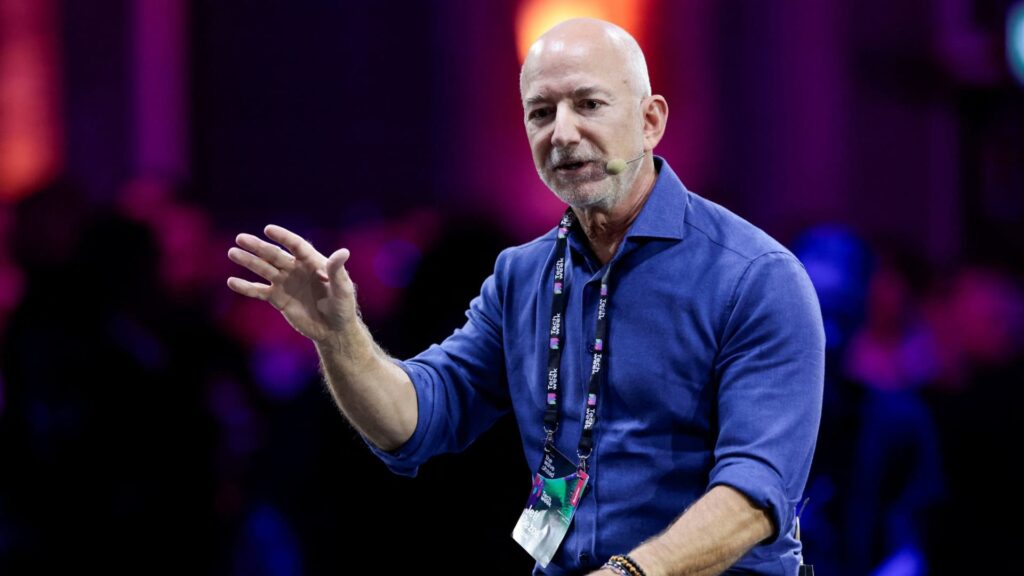You don’t have to start a company at age 20 to become a successful entrepreneur, according to Jeff Bezos. In fact, the billionaire Amazon founder recommends working at a successful, established company for several years before striking out on your own.
Rather than delaying your success, acquiring that valuable hands-on experience “increases your odds” of launching a successful business of your own when you’re ready to do so, Bezos said Friday at Italian Tech Week in Turin, Italy.
“I always advise young people: Go work at a best-practices company somewhere where you can learn a lot of basic fundamental things [like] how to hire really well, how to interview, etc.,” said Bezos. “There’s a lot of stuff you would learn in a great company that will help you, and then there’s still lots of time to start a company after you have absorbed it.”
Numerous entrepreneurs have founded multibillion-dollar startups after dropping out of college, and never acquiring substantial work experience before doing so. However, Bezos calls those success stories “the exception” — an understandable stance, considering that the majority of venture-backed startups fail and those that do succeed are typically led by older, experienced founders, research shows.
DON’T MISS: The ultimate guide to starting a business—everything you need to know to be your own boss
In 2021, TechCrunch analyzed more than 150 founders from the Y Combinator accelerator program whose startups went on to achieve valuations of at least $1 billion. Their average age when founding those startups was just over 28, the publication found.
More broadly, the mean age of founders of “high-growth startups” — defined as the top 0.1% of the fastest-growing new businesses in the U.S. — is 45, according to a 2019 study from researchers at the Massachusetts Institute of Technology.
Building “a large and impactful company” can take years, but prospective founders shouldn’t need to feel pressure to start at a young age, Y Combinator partner and Twitch co-founder Michael Seibel wrote in a 2017 blog post.
“My best advice is to move to a tech hub (preferably the Bay Area) and work for a tech company until you can save the money, make friends with the right potential teammates, or discover the problem that you are passionate about,” wrote Seibel, adding: “It’s fine to delay your start date in order to give yourself the best chance of success.”
Bezos was 30 when he launched Amazon. After graduating from Princeton University in 1986 with a degree in electrical engineering and computer science, Bezos landed a gig debugging lines of code at a telecommunications startup, Fitel, before working as a product manager for Banker’s Trust, now part of Deutsche Bank. From there, he became a vice president at an upstart hedge fund, D.E. Shaw, which focused on using advanced mathematical modeling to spot market trends.
Bezos “learned a tremendous amount” at Shaw, he said on Friday. That experience played a key role in his decision to launch Amazon, because he’d been tasked at the hedge fund with identifying untapped opportunities in the early internet space. He found a statistic showing web usage growing at a rate of 2,300% a year, sparking his interest in launching an online retail business.
The experience and knowledge he gained rising up the ranks at three different companies gave him a much better shot at success with Amazon than if he’d dropped out of college to start a company a decade earlier, he said.
“I think that extra 10 years of experience actually improved the odds that Amazon would succeed,” said Bezos, adding that he has no regrets about earning his college degree. “I enjoyed college and I think it’s been helpful to me.”
Even famous dropout-turned-entrepreneur Bill Gates has expressed regret over leaving Harvard University early, mainly because he had such “a great time” building friendships and taking a wide range of courses, from computer science to history and psychology, he told CNBC Make It in February.
The billionaire Microsoft co-founder is “not some person who promotes dropping out of college,” he said. “I’m a huge fan of a broad set of knowledge, and I think it’s an exceptional case where the urgency is such that you interrupt those college years to go do something else.”
Want to be your own boss? Sign up for CNBC’s new online course, How To Start A Business: For First-Time Founders. Find step-by-step guidance for launching your first business, from testing your idea to growing your revenue.
Plus, sign up for CNBC Make It’s newsletter to get tips and tricks for success at work, with money and in life, and request to join our exclusive community on LinkedIn to connect with experts and peers.

